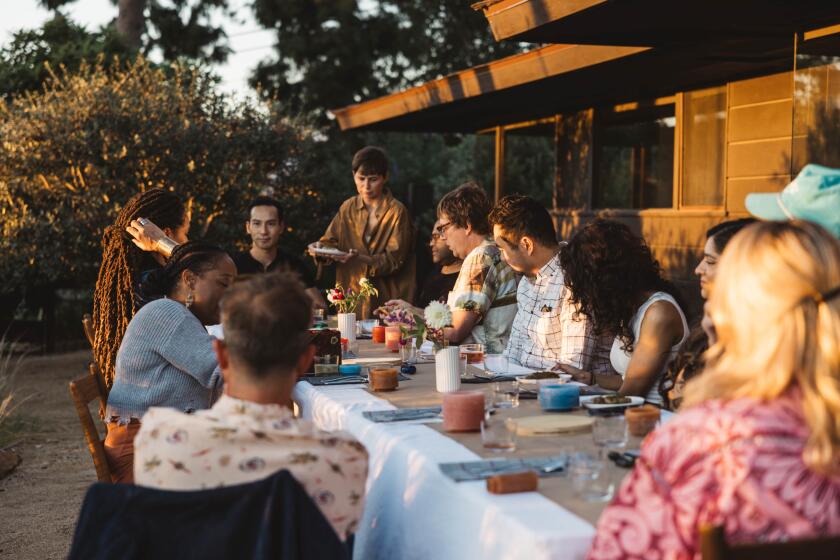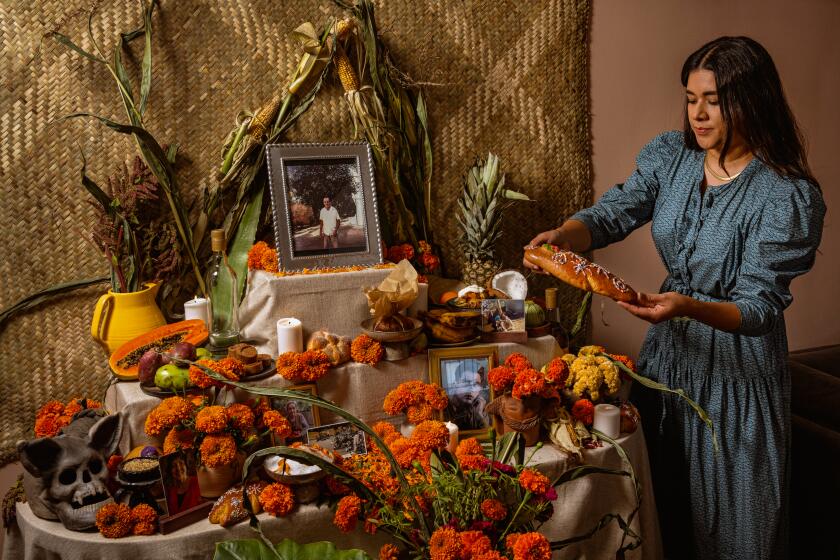California chef pioneered gourmet pizza revolution
In the days when pizza toppings mostly consisted of pepperoni, sausage, onions and peppers, chef Ed LaDou was a pioneer, adding gourmet toppings that had never before graced the face of pizza.
As the first pizza chef at Wolfgang Puck’s Spago and a developer of the first menu at California Pizza Kitchen, LaDou was an instrumental figure in a distinctly Californian phenomenon: the revolution that gave the world such innovative creations as the barbecue chicken pizza, pizza with breast of duck and hoisin sauce, pizza with marinated shrimp.
LaDou, who later opened his own restaurant, Caioti, died of cancer Dec. 27 at St. John’s Health Center in Santa Monica. He was 52.
“Ed really set the tone for the pizza,” said Mark Peel, a former chef at Spago who now owns Campanile in Los Angeles. “Wolfgang had a great sense of taste, but he was not a pizza maker by any means. Ed was highly skilled, fast and clean; he was an intelligent guy who made a great, great crust. There are people who have built empires on less.”
By most accounts, the history of the California pizza begins with Alice Waters and her Chez Panisse in Berkeley, with its wood-burning pizza oven and exotic toppings. But LaDou was a player in some of pizza’s key innovations.
LaDou was born Oct. 9, 1955, at McChord Air Force Base in Washington state, the son of a pilot. He spent part of his childhood in Los Altos, Calif., and worked his first restaurant jobs while still in high school, said his mother, Patricia Gallinetti of Moss Beach, Calif.
By the mid-1970s LaDou was working at restaurants in San Francisco, where he was known as an experienced pizza maker given to experimentation, topping pizzas with items such as eggplant and clams. Such experimentation was not always welcomed by his bosses, David Kamp wrote in his 2006 book, “The United States of Arugula: How We Became a Gourmet Nation,” but it appealed to diners, including one who would change the future of pizza.
One day while dining at Prego in San Francisco, Puck tried a LaDou original -- pizza topped with ricotta cheese, red peppers, pate and mustard. Puck offered him a job in his yet-unopened restaurant in Los Angeles.
In January 1982, Spago opened with LaDou as pizza chef, carrying out the visions of Puck. There was pizza topped with smoked salmon and pizza topped with duck sausage. Puck also allowed LaDou to select toppings.
“It was like being an artist who’d worked with 10 colors all of his life and then got to use 300,” LaDou once said.
The success of Spago was stunning. The Hollywood crowd, the rich and famous, packed the place to eat pizza made by LaDou.
“That was his pizza program,” Nancy Silverton, who was pastry chef at Spago, said in an interview Thursday. “Wolf certainly gave Ed the toppings that he wanted, but it was Ed that ran that department single-handedly in the beginning. . . . I think Ed definitely got a kick out of all of the stars that ate his pizza.” She now co-owns Pizzeria Mozza and Osteria Mozza in Los Angeles.
With Spago’s food in such high demand, getting a reservation there was tough. That gave two lawyers an idea.
“We saw the success he was having with the pizza up at Spago, so we decided to bring it to the masses,” Larry Flax, who in 1985 co-founded California Pizza Kitchen with Rick Rosenfield, said in an interview Thursday.
Flax had taken a pizza-making class from LaDou at Ma Maison in Los Angeles, where Puck was chef before opening Spago. But the attorneys were not cooks. “And so we had Ed come in and work with us at the beginning of the restaurant,” Flax said. “You’d have to say Ed was a pioneer in the California style of pizzas from his work with Wolfgang and us.”
LaDou helped develop the menu for California Pizza Kitchen, which went on to become a huge success, with restaurants throughout the nation. LaDou’s most enduring creation, the barbecue chicken pizza, is still on the menu, and now can be found at many other restaurants. LaDou seemed keenly aware that pizza was in the midst of an evolution.
“We are at the threshold of a new epoch in pizza dining, an epoch that will transform convention into invention and open up an infinite spectrum of pizza possibilities,” LaDou said in a 1985 Los Angeles Times article.
Shortly after designing the menu, LaDou left California Pizza Kitchen and eventually opened his own restaurant, Caioti, first in Laurel Canyon and later in Studio City, where his pizzas and other menu items continued to win fans. He found unintended success with an unlikely group of diners: pregnant women.
LaDou’s romaine and watercress salad, with its strong balsamic vinegar dressing, became the stuff of urban legend after overdue pregnant women said it induced labor. He shipped thousands of bottles of the dressing to mothers and fed others at his restaurant.
LaDou’s creations earned him recognition, including an invitation from the Smithsonian to demonstrate his expertise at the 2005 Smithsonian Folklife Festival.
“Not everything I’ve ever done has been wonderful,” LaDou said in a 2004 article at pizzamarketplace.com. “People used to ask me if there [is] anything you can’t put on pizza, and my answer still is, ‘Anything that doesn’t taste good.’ ”
In addition to his mother, LaDou is survived by his wife, Carrie LaDou, and their daughter Cassidy Rose, of Winnetka; his father Edward M. LaDou, stepmother Barbara LaDou and brother Christopher Gallinetti, all of San Diego; brother Gary Cavanaugh of Waldport, Ore.; and two half-sisters, Lani Cahill of Bakersfield and Lisa Cherry of Minnesota.
Services are pending.
--
More to Read
Eat your way across L.A.
Get our weekly Tasting Notes newsletter for reviews, news and more.
You may occasionally receive promotional content from the Los Angeles Times.










